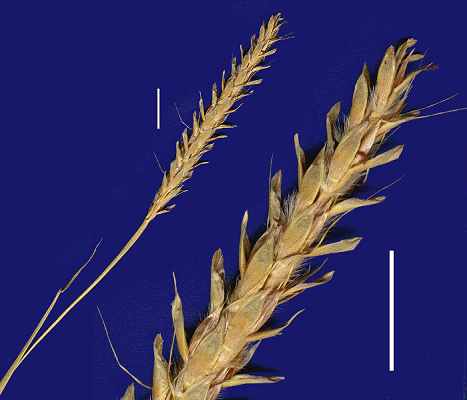 |
 |
|
 |
 |
|

Ischaemum australe R.Br.
|
Common name
Large Bluegrass
Derivation
Ischaemum L., Sp. Pl. 1: 1049 (1753); Gen. Pl. 5th edn,
469 (1754); from the Greek ischo (to restrain) and haima (blood),
as woolly seeds of the type species were reported as being used to stop bleeding.
australe- from the South (Australia).
Published in
Prodr. 205 (1810).
Common synonyms
Ischaemum arundinaceum F.Muell. ex Benth.
Ischaemum villosum R.Br.
Habit
Perennial, tufted. Rhizomes short. Culms erect, 50–150 cm tall, 4–5-noded.
Mid-culm nodes glabrous or pubescent or bearded. Lateral branches simple or
branched. Leaf-sheaths 10–15 cm long, glabrous on surface. Ligule a fringed
membrane, 2–3 mm long. Leaf-blades 10–20 cm long, 3–5 mm wide.
Leaf-blade surface glabrous.
Inflorescence
Inflorescence with ramose branches. Rames paired, 3–10 cm long. Rhachis
fragile at the nodes, angular, ciliate on margins. Rame internodes oblong, 3–6
mm long, flat and forming a U or V shape with the pedicel in rear view. Rame
internode tip transverse, cupiliform.
Spikelets
Spikelets in pairs, one sessile and fertile and the other (companion) spikelet
pedicelled. Pedicels oblong, 70–80% of length of internode, ciliate.
Companion spikelets developed, male or sterile, asymmetrical, lanceolate, laterally
compressed, 6–7 mm long, as long as fertile, separately deciduous. Companion
spikelet glumes chartaceous, keeled, winged on keels. Companion spikelet lemmas
2, enclosed by glumes, entire, muticous. Fertile spikelets 2-flowered, comprising
1 fertile floret, lower floret male, upper fertile, without rhachilla extension,
lanceolate, dorsally compressed, 6–7 mm long, falling entire, deciduous
from the base or with accessory branch structures. Spikelet callus base truncate,
inserted.
Glumes
Glumes dissimilar, firmer than fertile lemma. Lower glume oblong, asymmetrical,
100% of length of spikelet, chartaceous, 2-keeled, keeled laterally, narrowly
winged on keel. Lower glume surface flat. Lower glume apex acute. Upper glume
lanceolate, chartaceous, 1-keeled, winged on keel, 7-nerved. Upper glume margins
ciliolate.
Florets
Basal sterile florets 1, with palea. Lemma of lower sterile floret lanceolate,
membranous, 3-nerved, ciliate on margins, acute. Fertile lemma oblong, membranous.
Lemma apex dentate, 2-fid, 1-awned. Median (principal) awn from a sinus, curved,
8–10 mm long overall. Anthers 3, 3–5 mm long.
Continental Distribution:
Tropical Asia, Australasia.
Australian Distribution:
Western Australia, Northern Territory, Queensland, New South Wales.
Western Australia: Gardner, Fitzgerald, Dampier. Northern Territory: Darwin & Gulf, Victoria River, Barkly Tableland. Queensland: Cook, North Kennedy, South Kennedy, Port Curtis, Leichhardt, Wide Bay, Darling Downs, Moreton. New South Wales: North Coast, Central Coast.
Classification. (GPWG
2001):
Panicoideae: Andropogoneae
Notes
Native. Coastal districts, usually in wet situations. There are three varieties.
| 1. | Nodes glabrous | I. australe var. arundinaceum
(NT WA QLD) I. arundinaceum |
| Nodes hairy | 2 | |
| 2. | Leaves, rachis internodes and pedicels hairy | I. australe var. villosum
(NT QLD) I. villosum |
| Leaves, rachis internodes and pedicels glabrous | I. australe var. australe (NSW NT WA QLD) | |
Ischaemum australe var. arundinaceum (F.Muell. ex Benth.) B.K.Simon
Coastal regions of northern Qld, N.T. and northern W.A. in wet situations. Flowers
Jan.–Mar. and Aug.–Sept.
Ischaemum australe var. villosum (R.Br.) Benth.
Coastal regions of northern N.S.W., Qld and N.T. in wet situations. Flowers
Aug.–July.
Ischaemum australe R.Br. var. australe
Coastal districts from central N.S.W. through to the eastern Kimberley, W.A.,
in wet situations. Flowers Nov.–July.

Inflorescence (photo)
© B. Hacker

Inflorescence and detail of inflorescence (scanned specimen)
© Queensland Herbarium
by Will Smith
Ischaemum australe var. villosum

Inflorescence and detail of inflorescence (scanned specimen)
© Queensland Herbarium
by Will Smith
Ischaemum australe var. arundinaceum